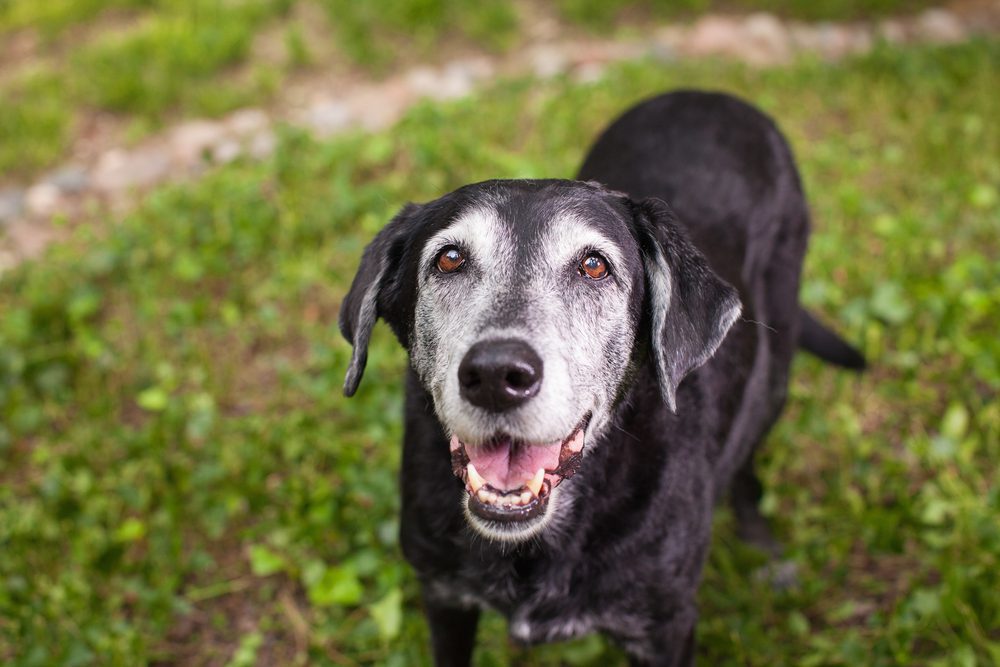Share This Article
Every year, November serves as Adopt a Senior Pet Month. This month is dedicated to promoting the many wonderful senior pets who are still looking for homes. Senior pets often get overlooked because most adopters prefer younger pets.
It’s understandable to want as much time as possible with a beloved pet, but senior pets have a lot to offer, too! Let’s talk more about Adopt a Senior Pet Month, why senior pets end up in shelters, and the myriad of fantastic reasons to adopt a senior pet!
What is Adopt a Senior Pet Month?
Every year, approximately 6.3 million pets enter U.S. animal shelters. Of those 6.3 million, about 920,000 are euthanized, according to data from 2019. When comparing data on euthanasia from January to July of 2022 to that from January to July of 2023, there has been a 37% increase in the euthanasia of dogs, which is largely attributed to economic issues that have arisen after the pandemic moratoriums ended.
When it comes to senior dogs, they are far less likely to get adopted than their more youthful counterparts, with the adoption rate being about 25% for senior dogs and 60% for young dogs. With these statistics in mind, Adopt a Senior Pet Month is meant to encourage potential adopters to consider adopting older pets so that they do not have to live out their final days in a shelter or, worse, be euthanized due to overcrowding.
Adopt a Senior Pet Month advertises and highlights the benefits of adopting a senior pet. Many shelters take part in this month by hosting events targeted at getting their senior pets adopted as well as by giving these senior pets more attention on their websites and on social media. November is Adopt a Senior Pet Month.
Why Do Senior Pets End Up in Shelters?
Though many cats that end up in shelters are strays, there are a myriad of reasons that any kind of pet – cat, dog, or otherwise – might end up in a shelter. There is a common misconception that shelter pets are unwanted for a reason, such as serious behavioral issues, but that is rarely the case. Let’s look at some of the real reasons that senior pets end up in shelters.
Older Owners
It’s not uncommon for older adults to own senior pets. Sometimes, these older people pass away and leave their pets behind, and no one in the family is able to care for the pet in their stead. Thus, the pet ends up in a shelter.
In other cases, the older person does not die but can no longer care for the pet due to health issues; if no family members can help, the pet may be sent to the shelter. Along with that, some older adults have to be moved to assisted living facilities or nursing homes as they can no longer safely live alone. These facilities cannot simultaneously house their pets, so oftentimes, the pet ends up at a rescue.
Relocation
Life doesn’t always go as planned, and sometimes people are forced to find a new living situation. When their new living situation doesn’t accommodate pets, their only option is to relinquish their pet to a shelter that can find the pet a new home.
In other cases, families may be moving across the country or even across the ocean to a different country entirely. Some nations may have different laws or restrictions on bringing animals into the country. It can also be a very long and stressful journey, so some people feel that it is better for the senior pet’s health and well-being to leave them behind at a shelter to find a new home.
New Family Member
Having a baby is an exciting occasion for most couples, but it can also be very stressful and overwhelming. Some couples surrender their pets as they do not feel they can simultaneously care for their pets and their baby.
In some situations, the added financial burden of a child makes it difficult to continue paying for the pet’s needs, as vet bills can get expensive, and senior pets may need to be on medications for issues like arthritis and joint pain.
Occasionally, some pets won’t get along well with the new baby. This is especially true if the pet in question has never interacted with an infant or child before. For dogs, socialization while they are puppies is immensely important to prevent them from being nervous, fearful, or aggressive when meeting new people, even tiny ones.
Not only that, but infants and young children do not have very good motor skills. They may grab onto the pet, squeeze it, or hit it unintentionally. Some pets won’t appreciate this kind of touch and may let the child know via posturing, such as growling, hissing, or grunting. In the worst-case scenario, a pet may try to physically harm the child as a warning.
Even if the pet is not aggressive with the child, if their behavior makes the family uncomfortable or concerned for the child’s safety, they may feel that surrendering the pet is the best option. Some senior pets do best in homes with no children or older children who know how to interact with them respectfully.
Economic Hardship
“We are all one bad day away from being homeless.” As eerie and uncomfortable as this quote is, for those who are not part of the one percent, it may have some truth to it. People face difficult decisions every day, and whether they actually become homeless or their finances simply take a hit, economic hardship is a common enough reason for people to give up their pets.
Senior pets can be more expensive to keep than younger pets. Though all pets are an expense, seniors may require more frequent vet visits or medications as arthritis and joint pain are relatively common, especially in large-breed dogs. Some people are simply unable to keep up with these costs and decide that surrendering their pet is their best or only course of action.

Reasons to Adopt a Senior Pet
Senior pets can make wonderful companions, and adopting one has many advantages. Here are five great reasons to adopt a senior pet during Adopt a Senior Pet Month.
1. You Know What You’re Getting
When you adopt a senior pet, what you see is what you get! If you have certain desires in terms of size, coat type, or coat length, you’ll know immediately what you’re getting with a senior pet. Meanwhile, it’s often impossible to know how big a puppy or kitten will grow, especially because many rescues are mixed breeds.
Similarly, some puppies and kittens may start with what looks like a short coat, but as they grow, the coat grows too. Sometimes, the coat can even have changes in color. That may sound unbelievable, but a good example would be the German wirehaired pointer (GWP) breed.
Sometimes, the puppies will have mostly white coats, but as they grow, the coat grows out and becomes darker. The tips of the fur may remain white, and there are still white hairs mixed into the coat. The result is a salt-and-pepper-colored dog! Of course, some GWPs do stay white — this is the perfect example of a dog that you won’t know how they truly look until they’re older. With a senior dog, there will be no such guessing.

Physical aspects aren’t the only thing that will be more apparent: a senior pet has already developed a personality. The rescue that is hosting them will be able to tell you a lot about their personality and can help you find a pet whose personality meshes well with your own.
2. House Training
Baby animals are cute and all, but they make a lot of messes. Since they aren’t potty-trained, you can expect them to pee and poop all over your house (or their enclosure) until you’ve taught them not to.
The advantage of a senior pet is that many of them are already house-trained. Whether they are a small mammal trained to go in a litter box or a dog trained to potty in the yard, you won’t have to worry about such messes in your home.
3. Less Destructive
Whether you’re interested in dogs or cats, both have a higher tendency to be destructive at a younger age. Young dogs often love to chew, and many dog owners have lost a favorite pair of shoes, a couch cushion, or sometimes even pieces of their home like wood trim or doors.
Cats aren’t chewers, but they are scratchers! Many cats have taken it upon themselves to add a bit of distressing to the furniture. Of course, just like dogs can be taught to chew on appropriate objects, cats can be taught to use scratching posts.
Still, most older pets are less destructive because these types of tendencies are dulled as they get calmer with age or because they’ve already been taught what’s acceptable and what isn’t.
4. Older Pets Are Calmer
If you lead a busy lifestyle and don’t have a lot of time to give to a pet but you do want to have a pet as a companion, a senior pet might be the perfect solution. Though every pet requires attention, senior pets are often easier to care for because they do not need much supervision and do not have nearly as much energy as their younger counterparts.
This means you won’t need to spend hours exercising them or giving them activities to do. Senior pets still need exercise, of course, but depending on their age and mobility level, the exercise may be nothing more than a short walk or play session (depending on the type of animal, of course). Many senior pets are content to lay around and spend time with you relaxing at home.
5. You’re Saving a Life
Even if you’re adopting a pet from a no-kill shelter, there’s a high likelihood that you’re saving a life without even knowing it. Many shelters work together to save as many pets as they can, and one of the ways they do so is by transferring pets from overcrowded kill shelters to no-kill shelters in different states.
By adopting a pet from that shelter, you’ve created a space that can be given to another pet in need. If you did adopt from a shelter that euthanizes pets due to overcrowding, then you’ll be able to see very obviously that you saved a pet’s life.
Because senior pets are so much less likely to get adopted, they are more likely to get euthanized. By adopting a senior pet, you have prevented a tragedy and given a wonderful creature a happy and loving home, and that’s something to be proud of.

Consider Adopting a Senior Pet
There is nothing more tragic than a senior pet having to live out their final days in the environment of a shelter. Though rescues do their best, it is simply not the same as having a comfortable and loving home.
Senior pets don’t end up in shelters because there is anything inherently bad about them. There are many reasons they might be there, but the vast majority of them would make a wonderful addition to any home.
There are many advantages to adopting a senior pet. You won’t have to wonder how big they’ll get because they’re already fully grown. Their personalities are easily apparent. They are calmer, less destructive, and are often house-trained. Best of all, by adopting a senior pet, you are saving a life. Consider adopting a senior pet regardless of whether or not it is Adopt a Senior Pet Month!
